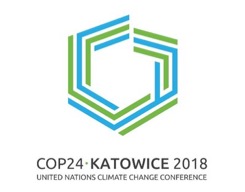By: Isabel Dávila

When the Paris Agreement was adopted during the COP21 in December 2015, news releases were filled with references to the landmark agreement. Statements from ENGOs,[6] celebrated what was seen as the most significant step forward in the international fight against climate change.
On December 2018, the 24th Conference of the Parties to the United Nations Framework Convention on Climate Change (UNFCCC) or COP24 took place in Katowice, Poland gaining much more press and attention than its two predecessors, COP22 and COP23. This is probably due to the deadline to reach agreements on the implementation of the Paris agreement set for 2018 and the release of the catastrophic UN Intergovernmental Panel on Climate Change (IPCC) report earlier this year. Unfortunately, with the conclusion of COP24, most headlines remain negative and concerning, and summarizing the outcomes as
The main outcome of COP24 was what has been referred to as the Paris rulebook. This rulebook and the negotiations leading to it are significant to the future of Canadian climate policy and legislation in a number of ways. Here, I will focus particularly on how it influences the country’s Article 4(2) of The Paris Agreement requires each Party to prepare, communicate and maintain successive nationally determined contributions (NDCs) that it intends to achieve. NDCs are a greenhouse gas reduction target based on Article 4 itself and mitigation efforts to achieve the target and are submitted to the Secretariat of the UNFCCC [7].
What will happen to Canada’s NDCs?
Canada’s position in COP24 as well as its membership to the High Ambition Coalition and the Powering Past Coal Alliance point to the possibility of Canada stepping up and filling a void in international climate leadership. As CBC noted, “With the United States preparing to leave the Paris agreement altogether, the host country less than enthusiastic about it, and the biggest European powers distracted by domestic events like the Brexit crisis and riots against a fuel tax in France, Canada is being pushed to lead where they can't or won't.” [8]. The government may seem willing to take on this role, with Minister McKenna highlighting Canada’s leading role in the carbon market and in tackling global climate change in the Conference [9]. But a number of activists and environmental groups remain skeptical with the latest actions of both the federal government (i.e. the decision to continue with the Trans Mountain pipeline) and provincial opposition to climate change initiatives indicating the opposite [10] [11] [12]. Nevertheless, the pressure to step up may have caused a significant change in Canadian climate policy, as the government provided official support to the High Ambition Coalition’s pledge to increase its NDCs and increase short-term action to achieve such pledges. Canada’s statements and positioning in COP24 certainly indicate a change in direction since its NDCs have not been ambitious enough to tackle climate change. Canada’s NDCs haven’t changed since the previous government. Furthermore, in 2017, when providing its
One of the key outcomes of COP24 was the adoption of rules around State Parties’ NDCs mandated under Article 4 of the Paris Agreement. These rules establish, among other things that Parties must 1) promote environmental integrity, transparency, accuracy, completeness, comparability and consistency, 2) use the latest emissions accounting guidance from the IPCC and 3) provide a list of information upon which the decision of its NDCs was made, including approaches used to address emissions and removals from natural disturbances on managed lands, are accounted for and which aren’t and how this is decided. This is particularly important for how emissions from the land use and forestry sector are considered, which remains unclear.
Uncertain future
Canada’s official statements tied to the rulebook guidelines for determining and reporting NDCs will certainly result in a change in Canada’s NDCs. What remains to be seen however, is the effectiveness of implementation even if the NDC increases. Canada has missed every one of its targets until now and is likely to miss its 2020 target. This, in spite of its intended NDC being considered unambitious by civil society and scientists. Even in this scenario, emissions in 2020 are expected to be nearly 20 percent above the target [14]. The implementation of a transparent and common guideline for climate pledges may force Canada to re-evaluate its current NDCs and programs to achieve them, particularly if it is to step up to the role of climate leader it has essayed to claim for the past couple years.

